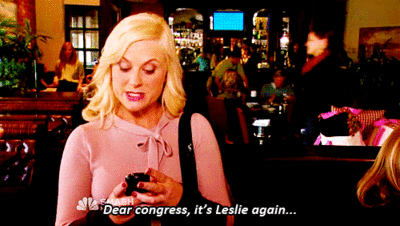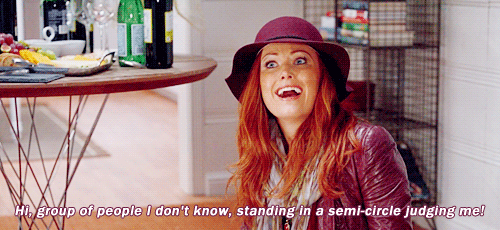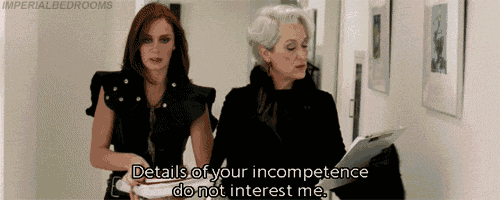Figuring out what to post on social media sometimes takes more effort than passing your organic chemistry class. You want your friends from home to see you having fun, but you don’t want your parents to see you having too much fun. Potential future bosses know how to find your least employable content, and your college peers are judging both your new posts and your TBTs. So to strike the delicate online balance between mature and fun, here’s how to handle a few common complications all college kids face when trying to update their profiles.
1. “I’m trying to find a roommate on Facebook.”

Facebook and Instagram stalking may give you a peek at a potential roomie’s life, but you should spend some time talking to them personally before making any quick decisions. The kid with the cliff-jumping profile picture might seem awesome while you’re Insta-stalking, but he may have some hidden interests that could either make you appreciate him even more, or decide to start “seeing other people” during your roommate quest.
2. “My friend and I took the best picture last Friday, but she’s holding her drink.”

Your family and friends aren’t naïve: just because you weren’t the one holding the alcohol in the picture doesn’t mean you’re home free. University of Alabama sophomore Anita Celaj said she always asks herself two questions before posting a picture from a night out on the town: “Is there alcohol in the picture? Do you look drunk? If you’ve answered no to all those questions, post away.” Though the justice system says you’re innocent until proven guilty, people’s assumptions from social media don’t work like that. Play it safe and don’t post anything that could lead to false assumptions.
3. “I’m pumped to vote in 2016, and I have a lot of opinions about the candidates.”

Sharing articles can often be a better way to prove your point, but if you feel the need to tell it in your own words, things can get tricky. Consider who’s following you when you phrase your tweet so that you don’t accidentally ignite World War III. Also, before posting political, keep your intended career path in mind. If you love politics so much that you want to work in the field, try not to ruin it for yourself by being too passionate too soon.
4. “I’m thinking about joining Greek Life.”

When you want to be accepted into a national organization, you need to put your best foot forward. Post pictures with your family and friends, but leave the unsavory activities out of them. Be your witty self on Twitter, but make sure your opinions are respectful. Highlight your attributes instead of calling attention to your more unflattering moments. “Keep it clean,” Celaj said. “Important people will be looking at your profiles to see what kind of person you are. Don’t let a silly drunken post ruin your chances of joining a great organization.”
5. “There are nine different professors for the English class I need to take next semester.”

You’re connected online with your whole freshman dorm, the kids from your Comm group project last semester and anyone you’ve ever met at a party. Chances are one of them has taken the class you’re thinking about, and who doesn’t love sharing opinions on social media? “My sorority sisters share in our Facebook group to help everyone with things like this,” said University of Tennessee sophomore Betsy Pierce. “The older girls help make my decisions much easier.” If a small group post doesn’t bring back any results, post a question in your class Facebook group. You’re not friends with all 8,000 of them, but some kind stranger will be happy to help.
6. “My club is having a fundraiser we need to promote.”

Take the passion you’ve got for a perfect selfie and direct it towards promoting fundraising events. If you’re as excited online about your improv group’s bake sale or your fraternity’s 5K as you are about your friends looking hot, then word will spread. All social media platforms are fair game, so reach far and wide. Even if you know your buddy has an exam the next day, the event will still pop up on his profile and the newsfeeds of his friends. Dedicate yourself to making this event headline news, and there won’t be a soul on campus who hasn’t heard about it.
7. “I’m trying to find an internship.”

LinkedIn is the number one place to show off your professional chops online. You might still be a few years away from the real-adult world, but building a profile can ease the pressure of trying to get that information across on your personal profiles. When it comes to Facebook, Instagram and Twitter, your profile picture doesn’t have to be your headshot, and your cover photo shouldn’t be your resume, but your pictures and posts should still paint a professional picture of you. “Even with party pictures, it’s easy to take pictures that aren’t something I would want to hide from an employer,” said University of Alabama sophomore Siobhan Sullivan. “Twitter is harder to keep totally G rated, but you don’t have to be raunchy to be interesting.”
8. “I post my weekend activities on Snapchat since it’s more private.”

You know that you were only filming your crazy roommates taking shots on a Wednesday, while you studied for your exam. For those outside your circle, your Snap pals will be happy to pass along the new gossip. “There was one night I was out with my friends and I got a text from my little brother that said, ’Dude. Embarrassing Snapchat Story. Delete it now,’” said University of Pittsburgh sophomore Olivia Maurer. Although you can sometimes count on your friends and family to jump in when they see something you let slide, it’s best to just monitor those precious seconds of hilarity.
9. “My friend posted something totally cringe-worthy.”

Even though you would never post a Snap Story of you shotgunning a beer at a frat party, some people have different standards (or no standards) for their social media. When your friends are the ones with no online shame, it’s tricky to criticize with care. There’s no use in arguing with them about what they think is a great Instagram pic after they’ve had a few, but the next day, a gentle reminder to take a look at their posts in the light of a new day never hurts. If it’s some sober subtweets or post-party pictures that concern you, drop a few hints about how you like to keep your risky behavior offline.
10. “I want to post a picture of me and a potential significant other.”

Even on the Internet, the ambiguity of the hook-up culture is unavoidable. It’s a real shame, especially when the pictures of you and the boy you’re “talking” to from your sorority formal are absolutely adorable. You look like a couple, but your Instagram followers have no way of knowing that you’re not. “A relationship should be between the two people involved, but social media can ruin that when people make assumptions based off what’s posted and not posted on social media,” said Pierce. If you’re not ready to go public with your not-a-relationship relationship, you might want to hang on to your posts until things get more serious.



















